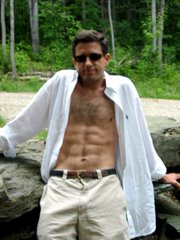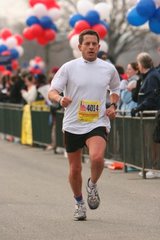I was supposed to be a chaperone for Will's class trip to Mount Monadnock today, but the car began misbehaving rather severely (smoke coming from the exhaust, losing power going up hills) en route, so I turned around, went home and worked instead. Argh. Beautiful day, too.
Busy, busy, busy.
Day job, doing financial mess, cleaning house ... where, oh Lord, does it all end?
(Don't need the answer immediately.)
Pepper seems to have pulled a muscle. She's been gimping the last few days, but still acts hurt if I don't throw her the damn ball. Stink's been helping out by grabbing it and running away so she doesn't go as fast, but I'm still a little worried.
Going to have a chicken gang-pluck this weekend, hopefully. There might be some video in it if you're good. And no, I won't be letting headless chickens flop around the yard. Don't feel like cleaning the dirt out.
Interesting NY Times story today on running exercises to make you faster. I guess the NYT and I are back on speaking terms since they've removed the "All the News That's Fit to Blog" logo from their online masthead. Here's the first few grafs:
October 4, 2007
Basic Training
Feet Don’t Fail Me Now (Think Mind Over Matter)
By SARAH TUFF
IF Matt Fitzgerald was your coach, he would have you running against the grain. Squat jumps would be a weekly must: Crouch down. Leap into the air. Repeat.
To increase your running speed, he occasionally would have you deliberately pound the ground to prevent overstriding. And, every once in a while, he would recommend doing an extra-long run without ingesting Gatorade or energy gels.
No doubt Mr. Fitzgerald, a 36-year-old running coach and racer who has written seven training books in the last four years, three for Runner’s World, gives unconventional advice. That is because his exercises are not meant to train your body. They are aimed at training your brain.
If you can change the way your brain interprets the signals your body sends, such as the all-too-familiar “My quads are killing me,” then you will not slow down, Mr. Fitzgerald said. Instead, you’ll soldier on.
The workouts he creates for the more than 700 clients on TrainingPeaks.com, an endurance coaching site for runners, cyclists and triathletes, are based on the so-called central governor model, a controversial exercise theory that has been a source of debate among exercise physiologists for decades.
Developed by Dr. Timothy Noakes, a professor of exercise and sports science at the University of Cape Town, and his colleagues, the theory says that the brain has the final say in endurance efforts, not the muscles, heart or lungs. The theory was presented briefly in Professor Noakes’s book “Lore of Running,” first published in 1985.
Supporting data and evidence for the central governor theory have been a long time coming. But that hasn’t stopped true believers from spreading the gospel. To help take the program he believes is the future of running mainstream, Mr. Fitzgerald wrote “Brain Training for Runners” (NAL Trade), a 562-page tome, published last month.
I think there's something to the mental toughness concept. I'd worry that 45-year-olds with undiagnosed heart conditions would read this, sign up for a marathon, and think, "Oh, it's just about toughness."
Still, it's probably why there are more 40-year-olds running marathons than 20-year-olds.
Like Old Doc Windrow used to say: "It's all downhill after you're 16, anyway."
On the bright side, this bit of dialogue just really said something:
Jon Stewart: Life’s a Campaign. Now if I read this correctly, and I believe I read this book correctly, what you are saying is: People can use what politicians do in political campaigns to help their lives.
Chris Matthews: Yeah. It’s irony isn’t it?
Jon Stewart: It strikes me as fundamentally wrong. It strikes me as a self-hurt book, if you will. Aren’t campaigns, fundamentally, contrivances?
Chris Matthews: Yeah, campaigns can be. But politicians, the way they get to the top, is the real thing. They know what they’re doing. You don’t have to believe a word they say, but you have to watch how far they got. How did [Bill] Clinton get there? How did Hillary get there? How did all these guys get there? Reagan. They have methods to get to the top.
Jon Stewart: So you’re suggesting that even if no one believes a word you say, you can be successful.
Chris Matthews: Yes.
Jon Stewart: Now that seems to me to be a book about sadness. Is it not?
Chris Matthews: No.
Jon Stewart: How? In what world?
Chris Matthews is right. But Jon Stewart is righteous.
Finished the Kunstler book. May blog about it later. May not. And in one of those totally serendeptious moments, I was driving Will back from school (he enjoyed the field trip, even without me) and we began talking about farm-related issues.
We do this in Vermont. Bear with me.
Turns out my youngest son has been sneaking into the Bill McKibben book. He ran off a 10-minute riff about corporate farming, arguing we need to go all small-scale, organic farms and return to community-based agriculture. Didn't amaze me all that much that he believes it, but he really made a really cogent, well-organized argument for a 13-year-old.
Color me impressed, anyway.
Subscribe to:
Post Comments (Atom)












No comments:
Post a Comment